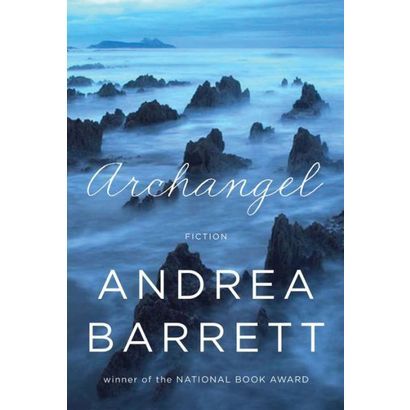In science and in life, we are all seekers. Or so Andrea Barrett suggests in her fine new book of stories. We search for clarity amid confusion and for truths obscured by tradition or emotion, and when we find what we’re looking for, we are dazzled.
“It changes everything, doesn’t it?” marvels a previously skeptical young teacher in “The Island,” upon reading Darwin’s theory of evolution for the first time. Barrett provides that same thrilling thunderbolt of discovery: When you read her elegant, thought-provoking work, you travel back to a time of wonder and possibility that you never want to leave.
Author of the magnificent story collections “Servants of the Map,” a Pulitzer Prize finalist, and “Ship Fever,” a National Book Award winner, Barrett has a degree in biology and infuses her works with her fascination with the natural world — from botany to physics to genetics and beyond. She’s also author of the novels “The Voyage of the Narwhal,” about Arctic exploration, and “The Air We Breathe,” set at a sanitorium for TB patients. Such familiar names as Darwin, Mendel and Linnaeus crop up frequently in her work.
In the five absorbing, loosely connected stories in “Archangel,” she again draws on historical figures and events to provide depth to stories of scientific revelation and disillusionment. But she doesn’t neglect more personal investigations, tapping into the fears, hopes and contradictions of the human mind and heart.
“The Investigators,” which opens the book, revels in the joy of discovery. Constantine Boyd is 12 in 1908, heading east from Detroit and his abusive father to spend a summer at his uncle’s farm. But his tasks in Hammondsport, N.Y., aren’t the milk-the-cows and feed-the-chickens routine he expects. “Constantine was to weigh each pail of milk and note the result. Also to weigh the amount fed to each calf, and to measure the calves themselves daily. The pigs and goats and lambs and fowl all had their own measurements, charts, and scales.”All this mysterious but intriguing activity awakens a desire to learn in the boy. He’s as infected as the entire town, which is humming with excitement over a plan to get an airplane off the ground and into history.
Like Constantine, Henrietta Atkins, the young teacher in “The Island,” finds the world opening up in unexpected ways. She is thrilled to attend a natural history course taught by a famous unnamed “Professor”.
Then a classmate introduces Henrietta to the controversial writings of Charles Darwin, and she strays from the Professor’s guiding hand. Barrett understands all too well the bitter discontent of an older generation whose facts have been made obsolete by brash new research and realities. “None of them knew,” the Professor thinks, “as he did, how the theories seized on with such enthusiasm by one generation might be discarded scornfully by the next.”
Another great mind disappoints writer and widow Phoebe Wells Cornelius in “The Ether of Space.” She admires the teachings of Sir Oliver Lodge but finds pitiful his denunciations of Einstein’s theory of general relativity. Much as she would love to talk to her dead husband, she’s appalled by Lodge’s insistence on the existence of a spirit world. But his mistake isn’t entirely his fault, Phoebe thinks: “Where you lived and what you knew determined what you expected to see. Once the moon was a smooth glowing orb, and then it had mountains and seas. Once Jupiter wandered alone, and then he had moons.”
Lodge lost his son in the war, so he seeks him desperately, a fact Phoebe doesn’t compute. But her teenage son, Sam — young, bright, possessing a more generous viewpoint — sees Lodge’s belief in a spirit world as worthwhile: “(E)vidence of love.” Sam’s interpretation of Lodge’s fumblings, expressed in a school paper, provides the most moving, electrifying moment in the book.
A grown-up Sam faces his own mortality in “The Particles,” in which he’s one of a group of geneticists rescued from the torpedoed Athenia at the start of World War II. Barrett offers up a grown-up Constantine, too, in the final, title story; he’s a soldier in northern Russia in 1919, still fighting a war long after it’s officially over.
Science can’t explain everything, Barrett tells us, not Constantine’s plight or Phoebe’s desperation at her slipping career or Sam’s failure to connect with his mentor. It can, however, illuminate our messy, troubled lives.
Send questions/comments to the editors.



Success. Please wait for the page to reload. If the page does not reload within 5 seconds, please refresh the page.
Enter your email and password to access comments.
Hi, to comment on stories you must . This profile is in addition to your subscription and website login.
Already have a commenting profile? .
Invalid username/password.
Please check your email to confirm and complete your registration.
Only subscribers are eligible to post comments. Please subscribe or login first for digital access. Here’s why.
Use the form below to reset your password. When you've submitted your account email, we will send an email with a reset code.